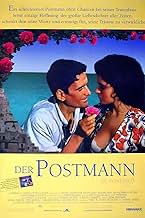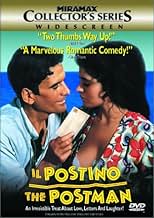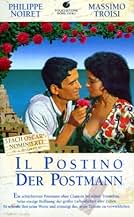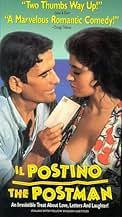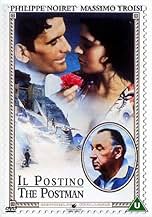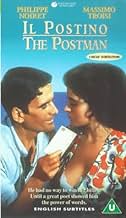NOTE IMDb
7,8/10
40 k
MA NOTE
Un facteur italien ordinaire apprend à aimer la poésie tout en livrant du courrier à un poète célèbre, puis l'utilise pour courtiser Béatrice, une beauté locale.Un facteur italien ordinaire apprend à aimer la poésie tout en livrant du courrier à un poète célèbre, puis l'utilise pour courtiser Béatrice, une beauté locale.Un facteur italien ordinaire apprend à aimer la poésie tout en livrant du courrier à un poète célèbre, puis l'utilise pour courtiser Béatrice, une beauté locale.
- Réalisation
- Scénario
- Casting principal
- Récompensé par 1 Oscar
- 31 victoires et 20 nominations au total
Calogero Azzaretto
- Bookseller
- (non crédité)
Simona Caparrini
- Elsa Morante
- (non crédité)
Angelo Casadei
- Cinema Spectator
- (non crédité)
Chuck Riley
- Narrator of Theatrical Trailer
- (voix)
- (non crédité)
Avis à la une
A sweet, gentle film about a quiet postman who discovers the power of poetry in winning the heart of his true love.
Massimo Troisi gives a warm, wonderful performance as said postman, while Phillipe Noiret plays the poet Pablo Neruda. The setting, a sleepy Italian village, gives the film a cozy atmosphere, and it's got a lovely score to match.
One of the rare foreign-language films to be nominated for a Best Picture Academy Award, it lost to the thunderingly stupid "Braveheart." Mel Gibson could use a little poetry himself.
Grade: A
Massimo Troisi gives a warm, wonderful performance as said postman, while Phillipe Noiret plays the poet Pablo Neruda. The setting, a sleepy Italian village, gives the film a cozy atmosphere, and it's got a lovely score to match.
One of the rare foreign-language films to be nominated for a Best Picture Academy Award, it lost to the thunderingly stupid "Braveheart." Mel Gibson could use a little poetry himself.
Grade: A
A beautiful movie that does an excellent job bringing to life Neruda's love poems and how they touch the life of a simpleton postman. It inspires in one, a spiritual and sensual love for poetry. The music is intricately woven into the fabric of the story, and is surely a high point in the movie. Great cinematography, matched frame by frame with the splendid acting, especially that of Massimo Troisi and Philippe Noiret. Watch this movie if you are disillusioned with the notion of romance, and need some succour.
The movie once again reinforces my admiration for the Italian film-makers. What amazes me is their simplicity in relating a tale, and how subtly pathos is displayed in their movies. This is also evidenced in "Life is Beautiful" and "The Bicycle Thief".
The movie once again reinforces my admiration for the Italian film-makers. What amazes me is their simplicity in relating a tale, and how subtly pathos is displayed in their movies. This is also evidenced in "Life is Beautiful" and "The Bicycle Thief".
Set in the early 1950s on a small Italian island, there are three central characters in this movie, one real and the other two fictional. The real one is Chilean poet Pablo Neruda (played by French actor Noiret who resembles Neruda quite nicely). Neruda died in 1973, but really did spend several years in exile in Italy, and really is a world-famous poet.
In this fictional story, simple and honest, but somewhat dim, 40-something Mario Ruoppolo (Massimo Troisi, who died of heart failure right before the movie was released) is the son of a small time fisherman. Mario really doesn't like the fishing, but has no job. At dad's encouragement, he finds a temporary job as a postman, "il postino." The famous poet is moving into the small village and a man with a bicycle is needed to deliver his mail daily. It pays very little in this poor village, but it is a job. And the friendship that eventually develops between Neruda and Mario changes their lives.
The third central character is pretty and sexy 20-something Beatrice (Maria Grazia Cucinotta) who works in her fiercely protective aunt's bar and restaurant. Mario admires her from afar, but Neruda's poetry gives Mario an entry. He tells Neruda later, "Poetry doesn't belong to those who write it, it is for those who need to use it."
A very charming and meaningful movie on DVD for those who don't mind reading English subtitles. Or, listen to it in Italian or French. Some of my favorite scenes were the conversations between Mario and the poet when the mail was delivered.
SPOILERS FOLLOW. Mario manages to win the affections of Beatrice through his poetry and they marry. The political climate changes in Chile allowing Neruda to return there. Mario is sad that Neruda does not seem to remember them. But he turns up perhaps 6 or 8 years later, meets Mario's young son and Beatrice, but finds that Mario had died in a rumble during a Communist rally in the square. The movie ends with Neruda on the beach where he and Mario had had so many wonderful conversations, reflecting on the beauty of the island and how it influenced his poetry. And the friendship with Mario.
In this fictional story, simple and honest, but somewhat dim, 40-something Mario Ruoppolo (Massimo Troisi, who died of heart failure right before the movie was released) is the son of a small time fisherman. Mario really doesn't like the fishing, but has no job. At dad's encouragement, he finds a temporary job as a postman, "il postino." The famous poet is moving into the small village and a man with a bicycle is needed to deliver his mail daily. It pays very little in this poor village, but it is a job. And the friendship that eventually develops between Neruda and Mario changes their lives.
The third central character is pretty and sexy 20-something Beatrice (Maria Grazia Cucinotta) who works in her fiercely protective aunt's bar and restaurant. Mario admires her from afar, but Neruda's poetry gives Mario an entry. He tells Neruda later, "Poetry doesn't belong to those who write it, it is for those who need to use it."
A very charming and meaningful movie on DVD for those who don't mind reading English subtitles. Or, listen to it in Italian or French. Some of my favorite scenes were the conversations between Mario and the poet when the mail was delivered.
SPOILERS FOLLOW. Mario manages to win the affections of Beatrice through his poetry and they marry. The political climate changes in Chile allowing Neruda to return there. Mario is sad that Neruda does not seem to remember them. But he turns up perhaps 6 or 8 years later, meets Mario's young son and Beatrice, but finds that Mario had died in a rumble during a Communist rally in the square. The movie ends with Neruda on the beach where he and Mario had had so many wonderful conversations, reflecting on the beauty of the island and how it influenced his poetry. And the friendship with Mario.
I've never seen him in anything else, but this performance by Massimo Troisi touches my soul. Stunning.
Mario takes up the job of postman on a small Italian island. The island has a new resident, the famed exiled Chilean poet Pablo Neruda, and he is receiving heaps of mail (mostly from women, to Mario's fascination). Mario strikes up a friendship with Neruda, who helps the not-overly-literate Mario develop his writing skills and appreciate poetry and prose. Then Mario meets a beautiful woman in the village and his new-found poetic skills are put to the test.
Great film. Wonderfully warm and charming, with a mellow style that is very engaging. Sweet plot that develops at just the right pace. The discussions between Neruda and Mario are a wonderful insight into creativity and how art is formed. The way Mario develops his creative side is also great to witness.
It does falter a bit in the third quarter or so. A certain point, about halfway through the movie, felt like a natural ending to the movie so it was difficult for the writers to develop the plot from such a high. Not that it was dull from that point on, it just didn't have quite the same ability to enthral. The ending is quite emotional though.
Great performances all round, especially by Massimo Troisi as Mario. He would go on to get a Best Leading Actor Oscar nomination for his efforts. Troisi also co-wrote the film and received a Best Adapted Screenplay nomination. Sadly, he never saw the fruits of his labours as he died of a heart attack 12 hours after filming ended.
All in all Il Postino received 5 nominations at the 1996 Oscars, including for Best Picture and Best Director, and ended up winning one, for best score.
Great film. Wonderfully warm and charming, with a mellow style that is very engaging. Sweet plot that develops at just the right pace. The discussions between Neruda and Mario are a wonderful insight into creativity and how art is formed. The way Mario develops his creative side is also great to witness.
It does falter a bit in the third quarter or so. A certain point, about halfway through the movie, felt like a natural ending to the movie so it was difficult for the writers to develop the plot from such a high. Not that it was dull from that point on, it just didn't have quite the same ability to enthral. The ending is quite emotional though.
Great performances all round, especially by Massimo Troisi as Mario. He would go on to get a Best Leading Actor Oscar nomination for his efforts. Troisi also co-wrote the film and received a Best Adapted Screenplay nomination. Sadly, he never saw the fruits of his labours as he died of a heart attack 12 hours after filming ended.
All in all Il Postino received 5 nominations at the 1996 Oscars, including for Best Picture and Best Director, and ended up winning one, for best score.
Le saviez-vous
- AnecdotesWriter/co-director/star Massimo Troisi postponed heart surgery so he could complete the film. The day after filming was complete, he suffered a fatal heart attack.
- Citations
Mario Ruoppolo: Poetry doesn't belong to those who write it; it belongs to those who need it.
- Versions alternativesThe Italian version of the film includes an additional title credit for Massimo Troisi, listed as co-director of the movie together with Michael Radford.
- ConnexionsEdited into Laggiù qualcuno mi ama (2023)
- Bandes originalesMadreselva
Written by Francisco Canaro (as F. Canaro) and Luis César Amadori (as L.C. Amadori)
Performed by Carlos Gardel
Courtesy of E. Musical Pirovano
Meilleurs choix
Connectez-vous pour évaluer et suivre la liste de favoris afin de recevoir des recommandations personnalisées
Détails
- Date de sortie
- Pays d’origine
- Sites officiels
- Langues
- Aussi connu sous le nom de
- The Postman
- Lieux de tournage
- Pollara, Salina Island, Aeolian Islands, Messina, Sicily, Italie(rural and beach scenes)
- Sociétés de production
- Voir plus de crédits d'entreprise sur IMDbPro
Box-office
- Budget
- 3 000 000 $US (estimé)
- Montant brut aux États-Unis et au Canada
- 21 848 932 $US
- Week-end de sortie aux États-Unis et au Canada
- 95 310 $US
- 18 juin 1995
- Montant brut mondial
- 21 901 256 $US
- Durée1 heure 48 minutes
- Couleur
- Mixage
- Rapport de forme
- 1.66 : 1
Contribuer à cette page
Suggérer une modification ou ajouter du contenu manquant





